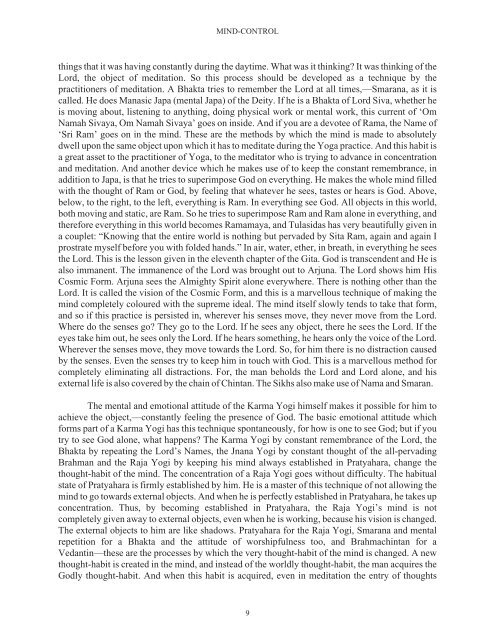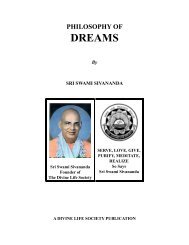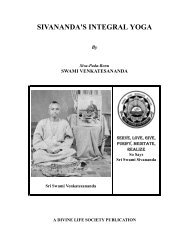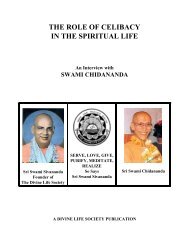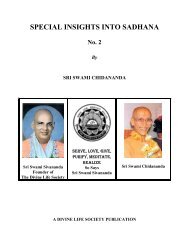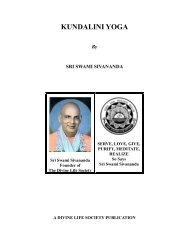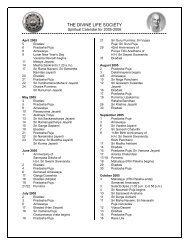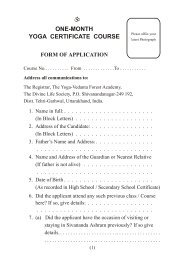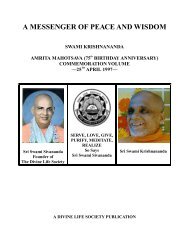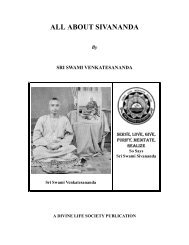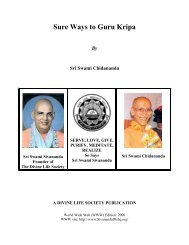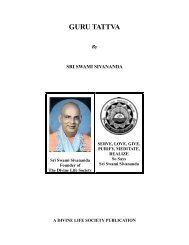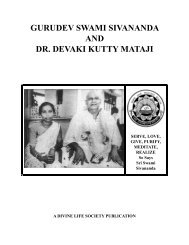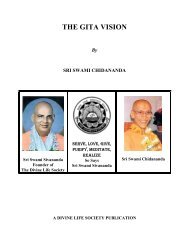Message of Swami Chidananda to Mankind - The Divine Life Society
Message of Swami Chidananda to Mankind - The Divine Life Society
Message of Swami Chidananda to Mankind - The Divine Life Society
You also want an ePaper? Increase the reach of your titles
YUMPU automatically turns print PDFs into web optimized ePapers that Google loves.
MIND-CONTROLthings that it was having constantly during the daytime. What was it thinking? It was thinking <strong>of</strong> theLord, the object <strong>of</strong> meditation. So this process should be developed as a technique by thepractitioners <strong>of</strong> meditation. A Bhakta tries <strong>to</strong> remember the Lord at all times,—Smarana, as it iscalled. He does Manasic Japa (mental Japa) <strong>of</strong> the Deity. If he is a Bhakta <strong>of</strong> Lord Siva, whether heis moving about, listening <strong>to</strong> anything, doing physical work or mental work, this current <strong>of</strong> ‘OmNamah Sivaya, Om Namah Sivaya’ goes on inside. And if you are a devotee <strong>of</strong> Rama, the Name <strong>of</strong>‘Sri Ram’ goes on in the mind. <strong>The</strong>se are the methods by which the mind is made <strong>to</strong> absolutelydwell upon the same object upon which it has <strong>to</strong> meditate during the Yoga practice. And this habit isa great asset <strong>to</strong> the practitioner <strong>of</strong> Yoga, <strong>to</strong> the medita<strong>to</strong>r who is trying <strong>to</strong> advance in concentrationand meditation. And another device which he makes use <strong>of</strong> <strong>to</strong> keep the constant remembrance, inaddition <strong>to</strong> Japa, is that he tries <strong>to</strong> superimpose God on everything. He makes the whole mind filledwith the thought <strong>of</strong> Ram or God, by feeling that whatever he sees, tastes or hears is God. Above,below, <strong>to</strong> the right, <strong>to</strong> the left, everything is Ram. In everything see God. All objects in this world,both moving and static, are Ram. So he tries <strong>to</strong> superimpose Ram and Ram alone in everything, andtherefore everything in this world becomes Ramamaya, and Tulasidas has very beautifully given ina couplet: “Knowing that the entire world is nothing but pervaded by Sita Ram, again and again Iprostrate myself before you with folded hands.” In air, water, ether, in breath, in everything he seesthe Lord. This is the lesson given in the eleventh chapter <strong>of</strong> the Gita. God is transcendent and He isalso immanent. <strong>The</strong> immanence <strong>of</strong> the Lord was brought out <strong>to</strong> Arjuna. <strong>The</strong> Lord shows him HisCosmic Form. Arjuna sees the Almighty Spirit alone everywhere. <strong>The</strong>re is nothing other than theLord. It is called the vision <strong>of</strong> the Cosmic Form, and this is a marvellous technique <strong>of</strong> making themind completely coloured with the supreme ideal. <strong>The</strong> mind itself slowly tends <strong>to</strong> take that form,and so if this practice is persisted in, wherever his senses move, they never move from the Lord.Where do the senses go? <strong>The</strong>y go <strong>to</strong> the Lord. If he sees any object, there he sees the Lord. If theeyes take him out, he sees only the Lord. If he hears something, he hears only the voice <strong>of</strong> the Lord.Wherever the senses move, they move <strong>to</strong>wards the Lord. So, for him there is no distraction causedby the senses. Even the senses try <strong>to</strong> keep him in <strong>to</strong>uch with God. This is a marvellous method forcompletely eliminating all distractions. For, the man beholds the Lord and Lord alone, and hisexternal life is also covered by the chain <strong>of</strong> Chintan. <strong>The</strong> Sikhs also make use <strong>of</strong> Nama and Smaran.<strong>The</strong> mental and emotional attitude <strong>of</strong> the Karma Yogi himself makes it possible for him <strong>to</strong>achieve the object,—constantly feeling the presence <strong>of</strong> God. <strong>The</strong> basic emotional attitude whichforms part <strong>of</strong> a Karma Yogi has this technique spontaneously, for how is one <strong>to</strong> see God; but if youtry <strong>to</strong> see God alone, what happens? <strong>The</strong> Karma Yogi by constant remembrance <strong>of</strong> the Lord, theBhakta by repeating the Lord’s Names, the Jnana Yogi by constant thought <strong>of</strong> the all-pervadingBrahman and the Raja Yogi by keeping his mind always established in Pratyahara, change thethought-habit <strong>of</strong> the mind. <strong>The</strong> concentration <strong>of</strong> a Raja Yogi goes without difficulty. <strong>The</strong> habitualstate <strong>of</strong> Pratyahara is firmly established by him. He is a master <strong>of</strong> this technique <strong>of</strong> not allowing themind <strong>to</strong> go <strong>to</strong>wards external objects. And when he is perfectly established in Pratyahara, he takes upconcentration. Thus, by becoming established in Pratyahara, the Raja Yogi’s mind is notcompletely given away <strong>to</strong> external objects, even when he is working, because his vision is changed.<strong>The</strong> external objects <strong>to</strong> him are like shadows. Pratyahara for the Raja Yogi, Smarana and mentalrepetition for a Bhakta and the attitude <strong>of</strong> worshipfulness <strong>to</strong>o, and Brahmachintan for aVedantin—these are the processes by which the very thought-habit <strong>of</strong> the mind is changed. A newthought-habit is created in the mind, and instead <strong>of</strong> the worldly thought-habit, the man acquires theGodly thought-habit. And when this habit is acquired, even in meditation the entry <strong>of</strong> thoughts9


